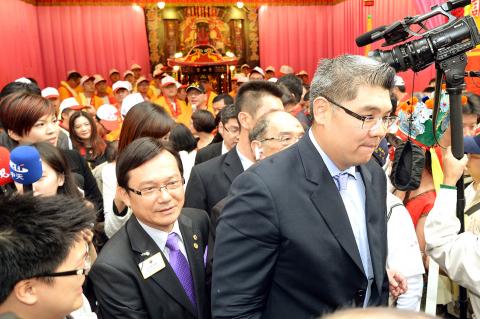Former Taipei EasyCard Corp chairman Sean Lien (連勝文) yesterday remained tight-lipped about his bid for the Taipei mayoral election, while a new poll showed that National Taiwan University’s Department of Traumatology director Ko Wen-je (柯文哲) would obtain more support than Lien if he joined the race.
The poll, conducted by Trend Survey & Research Co on Oct. 31, showed that 39.1 percent of respondents said they would support the independent Ko in the Taipei mayoral election if he were a candidate, while support for Lien, as the KMT representative, would be 33.5 percent.
Lien, son of former Chinese Nationalist Party (KMT) chairman Lien Chan (連戰), has been the most popular contender in the pan-blue camp to represent the KMT in the race. He declined to confirm his bid yesterday and said there are issues to consider before making his decision.

Photo: CNA
“If I were to think of my own interests, I would stay away from [the election]. Anyone who wants to live happily should not participate in politics. However, if I want to make a contribution to society, I need to consider carefully if I can contribute to society and how I can do so,” he said yesterday after delivering a speech at Shih Hsin University.
Lien has reportedly been unable to make up his mind due to health reasons and a shooting incident in 2010, in which he was shot in the cheek during election campaign activities in New Taipei City (新北市).
He has said that his family opposes his involvement in politics following the incident and acknowledged that his personal safety is his main concern.
Lien shrugged off the poll result and dismissed rumors that he would be Legislative Speaker Wang Jin-pyng’s (王金平) running mate in the 2016 presidential election.
“This is an amusing question — [The rumor] was spread by an individual to a specific media outlet,” he said.
In another poll conducted among hopefuls in the pan-green camp, Ko, an independent, won a support rating of 39.1 percent. Support for former vice president Annette Lu (呂秀蓮) was 17.2 percent and lawyer Wellington Koo (顧立雄) had 9.8 percent.
Lu yesterday dismissed the poll result and said she would strive for victory in the election.

ANOTHER EMERGES: The CWA yesterday said this year’s fourth storm of the typhoon season had formed in the South China Sea, but was not expected to affect Taiwan Tropical Storm Gaemi has intensified slightly as it heads toward Taiwan, where it is expected to affect the country in the coming days, the Central Weather Administration (CWA) said yesterday. As of 8am yesterday, the 120km-radius storm was 800km southeast of Oluanpi (鵝鑾鼻), Taiwan’s southernmost tip, moving at 9kph northwest, the agency said. A sea warning for Gaemi could be issued tonight at the earliest, it said, adding that the storm is projected to be closest to Taiwan on Wednesday or Thursday. Gaemi’s potential effect on Taiwan remains unclear, as that would depend on its direction, radius and intensity, forecasters said. Former Weather Forecast

As COVID-19 cases in Japan have been increasing for 10 consecutive weeks, people should get vaccinated before visiting the nation, the Centers for Disease Control (CDC) said. The centers reported 773 hospitalizations and 124 deaths related to COVID-19 in Taiwan last week. CDC Epidemic Intelligence Center Director Guo Hung-wei (郭宏偉) on Tuesday said the number of weekly COVID-19 cases reported in Japan has been increasing since mid-May and surpassed 55,000 cases from July 8 to July 14. The average number of COVID-19 patients at Japan’s healthcare facilities that week was also 1.39 times that of the week before and KP.3 is the dominant

The Chinese Communist Party’s (CCP) working group for Taiwan-related policies is likely to be upgraded to a committee-level body, a report commissioned by the Mainland Affairs Council (MAC) said. As Chinese President Xi Jinping (習近平) is increasingly likely to upgrade the CCP’s Central Leading Group for Taiwan Affairs, Taiwanese authorities should prepare by researching Xi and the CCP, the report said. At the third plenary session of the 20th Central Committee of the CCP, which ended on Thursday last week, the party set a target of 2029 for the completion of some tasks, meaning that Xi is likely preparing to

US-CHINA TRADE DISPUTE: Despite Beijing’s offer of preferential treatment, the lure of China has dimmed as Taiwanese and international investors move out Japan and the US have become the favored destinations for Taiwanese graduates as China’s attraction has waned over the years, the Ministry of Labor said. According to the ministry’s latest income and employment advisory published this month, 3,215 Taiwanese university graduates from the class of 2020 went to Japan, surpassing for the first time the 2,881 graduates who went to China. A total of 2,300 graduates from the class of 2021 went to the US, compared with the 2,262 who went to China, the document showed. The trend continued for the class of 2023, of whom 1,460 went to Japan, 1,334 went to